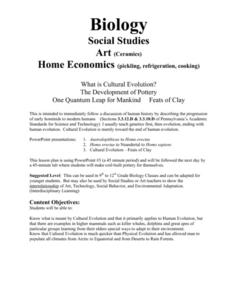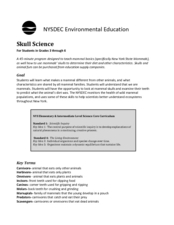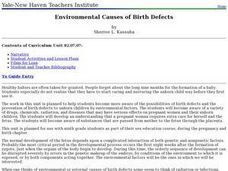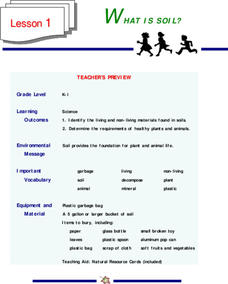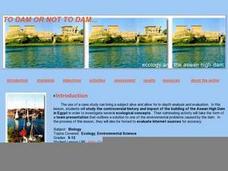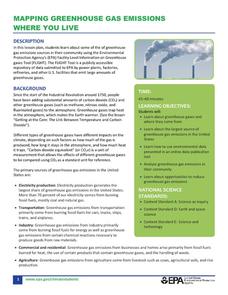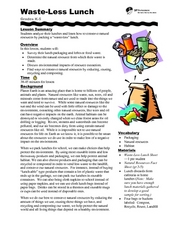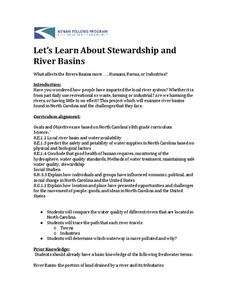Carnegie Mellon University
Consumer Preferences in Lighting
What is a watt? This tongue-twisting, mind-bending question and others are answered through this instructional activity on the different lighting options available. With the support of a PowerPoint, teach your physical science class...
Curated OER
Where is Away?
Focusing on where are garbage goes once we dispose of it, learners explore environmental concerns. Using a clear format, this lesson leads learners through a discussion of waste reduction, recycling, and composting. Then, they discuss...
National Wildlife Federation
Green Green Revolution
School budgets don't have a lot of extra money, so when students propose saving the district money, everyone jumps on board. The first lesson in the series of 21 introduces the concept of an energy audit. Scholars form an eco-action team...
Curated OER
What is Cultural Evolution?
Students comprehend what is meant by Cultural Evolution and that it primarily applies at Human Evolution, but that there are examples in higher mammals such as a killer whales, dolphins and great apes of particular groups by exploring...
Curated OER
Skull Science
What can your class learn from a skull? With proper facilitation, they can learn about diet, physical adaptations, special differences, and even the environment. Pupils will examine a series of mammal skulls and pelts to help them...
Chicago Botanic Garden
What Can Tree Rings Tell Us About Climate?
Tree rings are slightly thicker on the south side of the tree because it receives more sunlight. Part two in a series of five lessons helps learners analyze tree rings to determine the environmental conditions that caused size...
Curated OER
Environmental Causes of Birth Defects
Get your high schoolers thinking about the factors that lead to birth defects. They examine how environmental factors and personal choices can cause birth defects in unborn children. They discover the effects of various handicaps such as...
Virginia Department of Education
Predator-Prey Simulation
Do your pupils have the misconception that environmental predators are "bad" and harm smaller creatures? The simulation explains, in detail, the important role predators play in maintaining a stable ecosystem. Through web-based research,...
Virginia Department of Education
Molar Heat of Fusion for Water
How can you describe heat of fusion in a way the class understands and relates the importance of this concept to present day issues? In this third activity of the series, learners conduct an experiment, demonstrating the flow of heat...
Curated OER
Aquatic Science
What a terrific way to explore the pond habitat! Learners discuss the animal and plant life found in the Long Island area. They also discuss vocabulary terms, identify pollution concerns, and resource conservation.
Curated OER
What is the Rock Cycle and Its Processes?
Geology beginners examine three different rock samples and determine their origin by their characteristics. By making and recording observations, they become familiar with features of igneous, metamorphic, and sedimentary rock types....
Curated OER
What is Energy?
Youngsters take a look at the foods they eat, and how they provide energy for them to do things. They look at how body uses the food energy to create movement. Pupils also look at toys/devices in the room that need electrical energy...
Curated OER
What is Soil?
Students study living and non-living materials that are found in soil. They study the things required by plants and animals to remain healthy. They design a collage of sand, stones, leaves and other natural items.
Curated OER
To Dam or Not to Dam
Young ecologists explore the Aswan Dam in Egypt via the internet. Each collaborative group is assigned a specific article about the ecological impact of the dam. Then they prepare a presentation to share with the rest of the class. Some...
US Environmental Protection Agency
Mapping Greenhouse Gas Emissions Where You Live
After investigating the US Environmental Protection Agency's climate change website, your environmental studies students discuss greenhouse gas emissions. They use an online interactive tool to look at data from power production...
SF Environment
Sort and Color!
Sorting is a very important skill that can be used in math and even science. Learners get familiar with some environmentally friendly vocabulary terms as they practice separating objects that can be recycled from those that can't. They...
SF Environment
Waste-Less Lunch
Is it possible to have a waste-less lunch? Can your class become leaders in conservation? Discuss the importance of reducing waste during lunch time with a fun instructional activity that can be extended to everyday practices. First the...
US Environmental Protection Agency
Getting to the Core: The Link Between Temperature and Carbon Dioxide
Polar ice samples provide scientists with valuable information about the condition of the atmosphere for hundreds of thousands of years in the past. Of particular interest is the amount of carbon dioxide in the atmosphere and its...
Chicago Botanic Garden
Impacts of Climate Change
Scholars become experts on the eight major impacts of climate change through a jigsaw and grand conversation. They then research and present what they learned about effects specific to their region.
Kenan Fellows
Let's Learn About Stewardship and River Basins
What does it mean to be a good steward? Middle school environmentalists learn to care for their state's waterways through research, a guest speaker, and poster activity. Groups must locate and learn more about a river basin and the human...
National Science Teachers Association
Hop into Action
Young scientists find out what makes amphibians such unique and interesting animals in this simple life science lesson. After looking at pictures and discussing the characteristics of amphibians, learners complete a series of three Venn...
Curated OER
Wind Power
What a wonderful way to explore wind power! Through this lesson, learners get a background in the history of wind power, create their own wind turbine, and the test their designs. This is a terrific way to tie scientific principles to...
Virginia Department of Education
Freshwater Food Chains
What's in the water? Encourage your class to further explore this question and learn about pond ecosystems, food chains, and food webs as they complete this hands-on activity. They view the environment from a new perspective after...
Curated OER
Habitat, What is That?
Students explore animal habitats. In this environmental stewardship lesson plan, students match animals to their habitats in a classroom activity. Students also observe a firefly habitat and read Fireflies. Students create bulletin...





